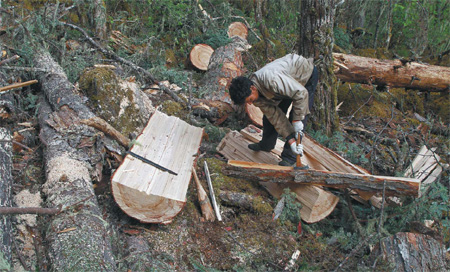Loggers encouraged to develop new businesses as trees protected, report Dachongand Peng Yining in Tibet.

Dawa, who earned his first ax 23 years ago, will use this spruce to repair thehouse he built. Tibetans in Nyingchi prefecture are allowed to fell five treesannually for that purpose, but commercial logging is banned. [Photos by FengYongbin / China Daily]
For centuries, when boys turned 17 in Nyingchi prefecture, the Tibet autonomous region, theywere asked to cut down a giant spruce tree to prove their manhood.
Dawa, a 40-year-old Nyingchi resident, said the murky virgin forests were the most profitableresource in mountainous Nyingchi, so a man's logging skills determined whether he could makea living and feed a family.
Dawa got his first axe at 17 after spending three hours felling a spruce "which was so thick thattwo adults could barely encircle it with their arms".
Dawa continued in the footsteps of his father and grandfather. "The only money I have evermade was in logging", but his 11-year-old son might not have the same opportunity, he said.
Large-scale commercial logging in Nyingchi prefecture, which holds the richest store of timberin Tibet, was banned last year. But the industry has been in decline since 2000 when thegovernment initiated conservation measures.
Tibetan loggers had to wave goodbye to a centuries-old lifestyle based on lumbering and lookforward.
All his work
Every piece of wood of Dawa's house was cut by Dawa himself from the surrounding leafyhillsides. It took him nearly two years and more than 30 big Picea (spruce) trees to build hisfamily of four a two-story shelter near a river at the foot of an immense verdant hill.
Bark and branches, the family's main fuel, are piled in the yard. Inside, the furniture was allmade from timbers, and Dawa carved out the wooden bowls and spoons from scraps. He saidmore than 600 shingles, made from five 100-year-old trees, were needed for the roof alone.
Dawa's family keeps 30 yaks and dozens of sheep but only for butter and meat. Most of theirincome used to come from lumbering and selling logs.
